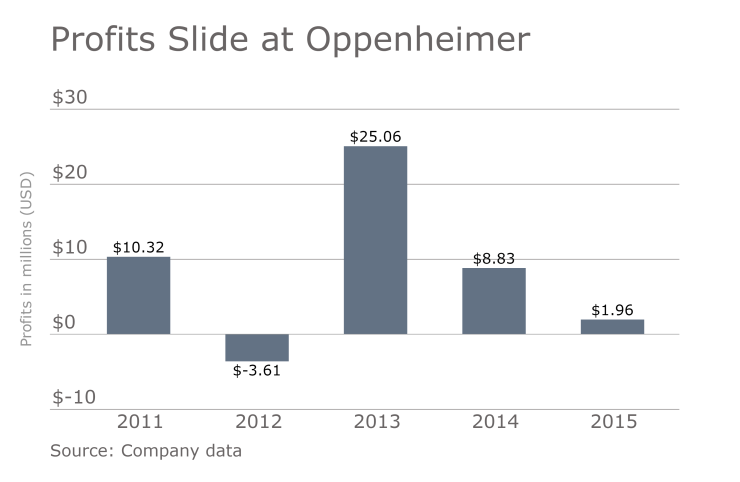Profits are up, but revenue and headcount continue to shrink at Oppenheimer, which has faced increased regulatory scrutiny over the past few years. The brokerage realized a quarterly profit on the back of the sale of its commercial mortgage banking business.
Despite bringing its year-over-year bottom line further into the black and recording a $5.2 million net profit, the brokerage firm’s core business continues to suffer. Revenue is down year-over-year as commission revenue fell to $92.6 million, a 10.6% decrease from the same quarter a year ago. Private client revenue dropped to $121 million, a 9.3% decrease.

The company cited market volatility, particularly surrounding the Brexit vote, and weak investor confidence as reasons for the drop in revenue. Client assets under management dropped, which led to an 8.5% decrease in advisory fees, said the company.
The poor results come on the heels of run-ins with regulators.
Most recently, Oppenheimer claimed it made a mistake overlooking a Michigan law requiring the registration of investment adviser representatives. Oppenheimer had failed to register 40 advisers and agreed to pay $650,000 in fines and 5 annual payments of $50,000 into an investor education fund.
Prior to that, the firm agreed to pay $20 million to settle related cases by the SEC and the Department of the Treasury's Financial Crimes Enforcement Network over failing to report an offshore client's improper sale of selling billions of shares of penny stocks.
-
The firm, which claimed it missed when Michigan made the requirement a law, called the oversight a "mistake."
July 26 -
Oppenheimer Holdings will pay $20 million to settle U.S. regulatory claims that it improperly sold billions of shares of penny stocks on behalf of an offshore brokerage.
January 27
Oppenheimer also recognized its shrinking adviser workforce is having an impact on revenues. Headcounts fell again, with the firm losing another 24 advisers this quarter, bringing the company’s total advisory force to 1,199 as of June 30th. This was an increase from the net loss of 10 advisers reported in the spring.
These declines came despite efforts to increase adviser productivity by making portfolio management more efficient. Oppenheimer unveiled a Vestmark product in June designed to provide more robust modeling and better order customization for asset managers, making the company’s platform “just as competitive as some of the larger wirehouses,” said Bryan McKigney, president of the asset management unit.
The firm also brought on new outside talent to strengthen its leadership. In June they hired wirehouse veterans Mark Trafford and Todd Wiggins to manage branches in Seattle and Atlanta. Trafford was branch manager at Wells Fargo and Wiggins came from UBS.
Oppenheimer boosted its bottom line with one-time net profits of $14.9 million from the sale of its commercial mortgage banking business to Walker & Dunlop in June. Walker & Dunlop purchased the business, Oppenheimer Multifamily Housing and Healthcare Finance, for $45 million.
Other loan sales during the quarter brought in another $1.5 million. Oppenheimer expects next quarter’s earnings to see an impact from the sale of construction loans to Berkley Point Capital.
Albert Lowenthal, CEO, said the sales would permit the company to focus on growth in “our core businesses of wealth management and institutional and corporate capital market businesses," according to the company.
Excluding one-time sales this quarter, Oppenheimer’s business is weak.
The company continues to report net losses from its business operations, which this quarter totaled over $2.6 million in red ink, down 74.5% from the same quarter a year ago. Although expenses also fell year-over-year, they only fell by 5.1%, compared to a 7% drop in revenue.
“Operating results for the period continued to reflect the extremely challenging business environment,” said Lowenthal. With advisers leaving the company and revenue down, the company is attempting a turnaround by adding new blood and better technology.





